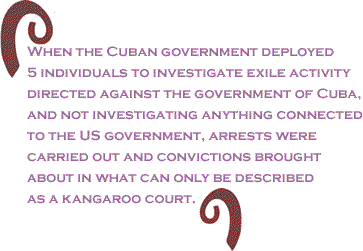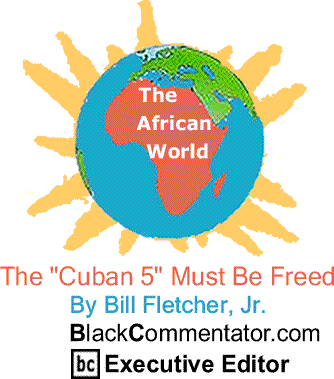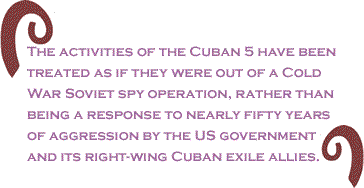
|
|||||||||||||||||||||||

Custom Search
|
|
 |
|
One of the oddest “espionage” cases on record is that of the so-called “Cuban 5.” The US Supreme Court is presently being petitioned to hear this case, a petition that has been accompanied by twelve amicus briefs from significant individuals and organizations. The essence of this case is in some respects quite straight forward. Terrorist attacks have been conducted against Cuba, in one form or another, since the success of the Cuban Revolution in 1959. These terrorist attacks have ranged from assassinations, to bombings, to an ill-fated attempt in the mid 1960s to set up anti-government guerrilla bases within Cuba itself. What these terrorist attacks have had in common has been the explicit or implicit support of the US government. What they have also had in common has been the support of right-wing Cuban exiles in the USA. In that context it should come as no surprise that the Cuban government would have an interest in knowing - in advance - of the plans by right-wing exile groups to carry out terrorist attacks. This is no different than any of the rhetoric we have been subject to by the US government since 11 September 2001 regarding the need to get ahead of the curve in knowing about terrorist assaults. Yet when the Cuban government deployed 5 individuals to investigate exile activity directed against the government of Cuba, and not investigating anything connected to the US government, arrests were carried out and convictions brought about in what can only be described as a kangaroo court.
The arrest and conviction of the Cuban 5 was a hypocritical action by the US, particularly in light of its rhetoric regarding a war against terrorism. Yet fear of an indictment for hypocrisy has never dissuaded the US from taking actions that the rest of the world condemns.
This is all old news. We now have a new President - President Obama - and confronting him is not only the challenge of whether he will continue Bush’s so-called war against terrorism, but whether he will alter the on-going, hostile approach of the US against Cuba. Step #1 should be the freeing of the Cuban 5. They have been imprisoned under inhumane conditions after their convictions and their imprisonment stands as testimony to a foreign policy that has lost all credibility in the eyes of the global community. President Obama has sent signals to the effect that US policy toward Cuba will change…slightly. It may become easier for families to reconnect and ultimately travel restrictions may be eased. But this is insufficient. The totality of US policy toward Cuba must be revamped. After all, it has not been Cuba that has launched attacks against the USA. Had Cuba carried out periodic incursions into the USA; had it supported individuals who bombed airplanes and hotels; and had it carried out assassination attempts against US Presidents, we would not even be having this discussion: Cuba would be a cinder. President Obama: the “Cuban 5” must be freed. BlackCommentator.com
Executive Editor, Bill Fletcher, Jr., is a Senior Scholar with the
Institute for Policy Studies,
the immediate past president of TransAfrica Forum and co-author of, Solidarity Divided: The Crisis in Organized Labor and a New Path
toward Social Justice |
|
Any BlackCommentator.com article may be re-printed so long as it is re-printed in its entirety and full credit given to the author and www.BlackCommentator.com. If the re-print is on the Internet we additionally request a link back to the original piece on our Website. Your comments are always welcome. eMail re-print notice
If you send us an eMail message we may publish all or part of it, unless you tell us it is not for publication. You may also request that we withhold your name. Thank you very much for your readership. |
|
| |
|
| March
26 , 2009 Issue 317 |
|
| Executive Editor: Bill Fletcher, Jr. |
| Managing Editor: Nancy Littlefield |
| Publisher: Peter Gamble |
| Est. April 5, 2002 |
Printer Friendly Version
in resizeable plain
text format or pdf
format. |
| Frequently Asked Questions |
 |

|
 |
 |
 |
| |
| |





































